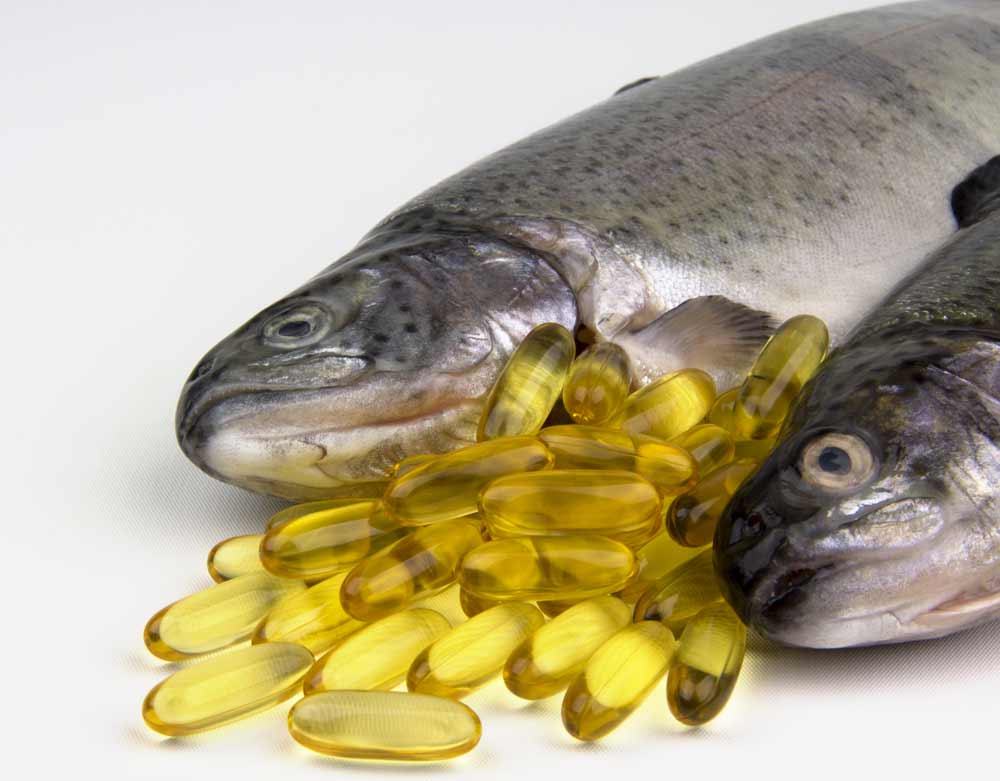Scientists have for the first time shown omega-3 supplements can reduce acne.
Dr. Jung and colleagues from the Seoul National University College of Medicine in South Korea tested the effect of omega-3 and gamma-linolenic acid (GLA) supplementation on acne. They took 45 people with acne and assigned them to one of the following groups for 10 weeks:
- Omega-3: 1000 mg of eicosapentaenoic acid (EPA) and 1000 mg of docosahexaenoic acid (DHA) daily. EPA and DHA are prominent fatty acids in fish.
- GLA: 2000mg of borage oil, containing 400mg of gamma-linolenic acid, daily.
- Control: No supplements.
The participants were young adults (average age 23 years), much like most Acne Einstein readers.
Results
This graph shows the reduction in inflammatory and non-inflammatory pimple count after 10 weeks of supplementation (as compared to beginning of the study).
Both omega-3 and GLA supplements reduced inflammatory acne by 40 to 50% and non-inflammatory acne by about 20%. The graph shows GLA worked better but don’t read too much into it. The difference is well within the margin of error, and there’s no statically significant difference between the groups. In plain English: both supplements worked just as well.
The researchers also measured the level of inflammation inside active pimples. In both treatment groups inflammation dropped by about 25%. This means that the people not only had fewer inflammatory pimples but the pimples were smaller and less painful.
Study limitations
My main gripe with this study is that the control group didn’t receive any supplements. The researchers should have given them olive oil capsules, or some other oil that has no effect on acne. As it is, it’s hard to evaluate how much of the improvement was due to treatment and how much due to placebo.
Conclusion
This is the first study to provide reasonably convincing evidence to support taking omega-3 or GLA supplements for acne. The previous studies were either negative or had other problems.
Despite lack of good studies, omega-3 supplementation has always made sense. Several studies on other health problems have shown omega-3 fats reduce inflammation, which is also at the root of acne. So it’s nice to see studies confirming it.
For the whole scoop on this, see my fish oil and acne post.




Isn’t eating canned mackerel a better way to get omega-3 fatty acids? It’s definitely cheaper (at least in Korea) and it can replace junk and sugary foods. Plus, you get vitamin D.
Yep, I don’t think it matters where you get the omega-3 fats. I just wrote about supplements since that’s what the researchers used in the study. I don’t take omega-3 supplements myself, I rely on enriched eggs.
I don’t think i can trust those enriched eggs very much. I believe they should feed those chickens with cod liver oil or fish oil in order to produce eggs rich in DHA and EPA. Those who are feeded with flax seed oil or canola oil will probably produce ALA only, but i am not sure. I think most of farmers will not bother to feed them with animal sources and even if they do, most likely they would use cheap, oxidized fish oil. As for this study, does anyone knows if GLA has anti androgenic effects and if it is safe for male consumption? Thanks
I looked at the studies on this one about a year ago. Chickens fed with plant sources of omega 3 produce eggs with less EPA and DHA than if they are fed with fish oil. That said, even those eggs contain decent amounts of EPA and DHA since chickens can convert ALA to EPA and DHA. Chickens fed with fish oil produce eggs with quite a bit of long-chain omega 3 fats. They tested commercially available eggs in Australia and found them to be a good source of omega 3 fats.
I just read the full text of this study. I couldn’t understand it very well because of the amount of medical terms, but it seems that omega 3 and GLA works through different ways. Having said that, do you think that if they combined both omega 3 and GLA the results would be even more significantly?
I can’t say I understand all the details on the paper either, especially when they talk about different pathways (the cells and chemicals causing the effect). But it does seem O3 and GLA both have an anti-inflammatory effect but it happens through different pathways.
But is their effect cumulative? That I can’t answer. I suspect there’s a lot of interchangeability between these things. On the other hand GLA has been shown to have direct effects on the skin, so it’s possible taking both would lead to somewhat better results.
But I generally recommend keeping supplements to the minimum. We don’t have good data on the long-term safety of most supplements, and that’s why it’s a good idea to only take those that really help.
Hi Seppo,
After researching GLA, I was shocked to find that it is a Omega-6 fat. All this time, haven’t we been told that omega-6 is inflammatory?
I’m surely missing something here
I think the problem is in the simplistic assumption that all omega-6 fats are inflammatory. Yes, o-6 fats are used to make inflammatory molecules in the body, but it doesn’t automatically mean they are bad for you.
Honestly speaking, I don’t really know what to think of the whole omega-6 thing. There is research to show that balancing omega-3 and omega-6 could be helpful, but it’s not particularly convincing research. There is also a lot of evidence to show that replacing saturated fats with omega-6 fats reduces heart diseases, insulin resistance and other health problems. I suppose that even food scientists don’t yet fully understand the role these fats, and their ratios, plays in health.
My attitude is not to worry too much about them. I make sure my diet contains omega-3 sources (usually omega-3 enriched eggs and seafood), and I avoid most processed and junk food. That gets rid of the largest and unhealthiest omega-6 sources from my diet. Beyond that I don’t really worry about omega-6 intake.
Hope this helps!
Thanks for your answer Seppo!
The omega-3-omega-6 balance concept confuses me too.
What are your thoughts on topical GLA like evening primrose oil?
They can be helpful for people with dry or irritated skin. Not sure they would do anything for people with acne-prone and oily skin.
Is Life Extention brand European Milk Thistle a good source of Silymarin? the label says 1 softgel gives 240 Silymarin, 90mg Silybin, 24mg Isosilybin A and B, phospholipids (380mg total). Also Siliphos Phytosome milk thistle extract (seed) providing 23.76mg Silybin (80mg total). Or would I be better using Omega 3 or both?
I’m sorry but I don’t have any insights on different supplement brands. Other than looking at the label, there’s no way for me to comment on supplements. If the supplement actually contains what it says on the label, then yes, it’s probably a good source of sillymarin. The problem in US is that the regulations governing supplements are so lax that there’s no way to know what’s in those pills. Life Extension is a popular brand, so one would assume they pay attention to quality control and good manufacturing practices.
You can try both omega-3 and sillymarin. Since your acne is on the moderate/severe side there’s a good chance that taking supplements helps.
Hi Seppo,
I’m thinking of taking an Omega 3 supplement as I don’t consume much fish on a regular basis. Would you recommend Nordic Natural’s Omega 3 supplement or Xtend-life’s Omega 3 Premium? Those are the two that I’m currently interested in due to their cGMP, Certificate of Analysis, low PCB content and just overall quality.
It’s very difficult for me to comment on individual supplement brands. I really have no unique insights into which supplements are good and which are not. If the company has good quality control practices in place, then they are probably good ones to try.
Hello seppo. What do you think of Alpha Lipoic Acid. I have read that it is very good for insulin sensibility and also it does renew vitamin c and e in humans. Also it does activate the main body antioxidant glutathion.
Thank for your replys. You are saving my head off confusion 😀
I haven’t looked into ALA before, but I did some reading on it. Can’t say I’m overtly impressed with what I read. I found a few studies on insulin sensitivity and the results were mixed, at best. One study showed an improvement, another was dead negative and third one so-so.
I does seem to act as an antioxidant and as such could be useful for people with moderate/severe forms of acne.
Also, please don’t put your email into the URL field. It often puts the comment into the moderation queue as it’s flagged for link spam.
With a bio like Artemis P. Simopoulos, M.D.
I think that she must know about omega-6 / omega-3 ratio…
She did this article after research with astronauts
https://www.ncbi.nlm.nih.gov/pubmed/12442909
“”Excessive amounts of omega-6 polyunsaturated fatty acids (PUFA) and a very high omega-6/omega-3 ratio, as is found in today’s Western diets, promote the pathogenesis of many diseases, including cardiovascular disease, cancer, and inflammatory and autoimmune diseases, whereas increased levels of omega-3 PUFA (a low omega-6/omega-3 ratio) exert suppressive effects. In the secondary prevention of cardiovascular disease, a ratio of 4/1 was associated with a 70% decrease in total mortality.””
You shouldn’t just look at what one person says about this. The thing is that there are dozens of people with equally impressive bios who are not that convinced that omega-6 fats are harmful.
I’m writing from the top of my head now and don’t have the papers in front of me. I recently did a lot of reading on this while I was updating my acne treatment course. The short story is that there’s very little convincing evidence that omega-6 fats are inflammatory or harmful. For example, there are several studies that show people who eat more omega-6 have less heart disease.
The common notion that omega-6 fats are inflammatory and omega-3 anti-inflammatory is an oversimplification.
I wouldn’t worry too much about this. My simple rule is to avoid processed vegetable oils and crappy bakery stuff, simply because they are unhealthy in many ways. On top of that I make sure to have some omega-3 rich foods in my diet, like omega-3 eggs. Beyond that I don’t worry about it.
I would worry quite a lot about omega 6. See this link https://davidgillespie.org/category/vegetable-oils/
I do agree that there’s no good reason to eat seed oils, but I don’t agree with the wholesale demonization of omega-6 fats. I just did a lengthy review of them while updating my book, and I don’t see any good reason to avoid whole foods that have a lot of omega-6 fats.
Now I agree and disagree. Everyone’s biochemistry operates a bit differently so it can be tricky. My experience from Omega 3 supplement is it made my acne worse. Gave me cystic-like and scalp acne.
I don’t eat fish or any meats as they all aggravate my acne. I personally would never touch OMEGA 3 again.
Thanks for sharing your experience. I’m somewhat doubtful of omega-3 hype myself, but there’s reasonable data to support eating/supplementing with moderate doses of long-chain omega-3 fats you’ll get from fish. Though, I have read some reports (anecdotes) like yours where someone says omega-3 supplements caused acne.